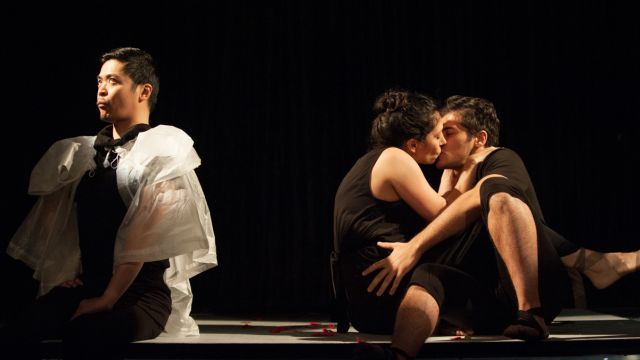Motherf**ker
It asks a lot of an audience to suspend their disbelief so far as to imagine the imperial court of ancient Thebes played on a small and rickety, creaking platform, mounted on scaffolding and backed by black plastic drapes that don’t quite close. I couldn’t suspend mine. The creaky platform is unfortunately just one of the many artistic misjudgments in this version of the Oedipus story.
That’s not to say that it’s a production devoid of ideas and reinterpretations. No, the problems are not all in the concept; most are in the execution.
In terms of story, Queen Jocasta is usually sidelined or given little or no character. In Sophocles’ telling, a servant comes on stage to report that the queen has killed herself – and that’s it. Here she becomes as central and important as Oedipus himself. Their initial passion (acknowledging the age difference about which surely people have always wondered) and later their enduring love (both things a ‘crime’) are earthy and dramatised here rather than being a mere plot point, a given.
Furthermore, we see the young Jocasta – mother, of course, of Oedipus – and the older Jocasta – wife of that same Oedipus - on stage together: Stephania Pountney and Tania Lentini respectively. One actor, Tony Larkin, plays both King Laius and the older Oedipus. Two actors together – Annie Lumsden and Antony Talia – and speaking as one play Tiresias, the seer – which is appropriate since Tiresias has been or is both man and woman.
But while these ideas are interesting and even worthwhile, if you didn’t know the story or these characters before you took your seat, chances are you would be none the wiser by the end of the evening. Comprehension isn’t helped by directorial excesses from Beng Oh – that is to say, touches which may have been ‘a good idea at the time’, but now look gimmicky and extraneous. The Sphinxes (Iliana Contos and Annie Lumsden) are also palace servants? The two Jocastas wolf down fruit and throw pips and peels away. The whole cast performs a ‘funny’ pop song? Antigone and Ismene in animal onesies?
 The next problem is, quite simply, diction in a play in which dialogue is not naturalistic. In this cast, Keith Brockett as a camp Creon (who knew?) is clear and menacing, and Tania Lentini achieves warmth and poignancy (if not majesty) partly by being simply understandable. Antony Talia as the young Oedipus is clear enough, but lacks the presence and smarts of the man who killed the stranger at the crossroads and solved the Riddle of the Sphinx. The remainder opt for volume and jumbled garble. Ms Lumsden, for instance, looks terrific, but you can’t understand a word she says.
The next problem is, quite simply, diction in a play in which dialogue is not naturalistic. In this cast, Keith Brockett as a camp Creon (who knew?) is clear and menacing, and Tania Lentini achieves warmth and poignancy (if not majesty) partly by being simply understandable. Antony Talia as the young Oedipus is clear enough, but lacks the presence and smarts of the man who killed the stranger at the crossroads and solved the Riddle of the Sphinx. The remainder opt for volume and jumbled garble. Ms Lumsden, for instance, looks terrific, but you can’t understand a word she says.
Put that alongside the fact that acoustics in the La Mama Courthouse are lousy. It is a small space and a whisper from an actor who has learned how to project will be far more effective than a yell. Actors shouting – the amateurs’ version of passion and emotion – certainly doesn’t work in this venue – and there is a lot of shouting in this show. Add the decision of Beng Oh to make his actors compete with the portentous sound and music by Tom Backhaus and we have something eventually tedious because robbed of its meaning.
Reinterpretation or not, it’s still a ‘Greek play’, which means a lot of exposition about the past or things occurring off stage. It is not a mime or a tableau; it depends on words. When words are delivered with stylistic grimacing, or two voices talking at once, plus shouting… well, forget it.
The Oedipus story, as the program notes point out, has been around for a long time – and it’s a story that has had four theatrical manifestations in Melbourne and Sydney in the last two and a half years. That suggests – if it doesn’t prove – an enduring fascination with this tale of fate, hubris and incest. But attempts to ‘humanise’ the legend, to make it ‘ordinary’ and turn it into ‘the royal family next door’, or to add comic relief, all these things in the end serve – at least in this case – to reduce and even trivialize the huge and mythic emotions of this enduring story. Jane Miller, Beng Oh and their cast have found some important hidden or underlying aspects of the story – such as Jocasta’s experience of this tragedy - but the realization proves misconceived and deeply unsatisfactory.
Michael Brindley
Images by Sarah Walker
Subscribe to our E-Newsletter, buy our latest print edition or find a Performing Arts book at Book Nook.

